10 класс. Контрольная работа №3.
Task 1. You will hear six people speaking about the environment and nature. Match what they say (1—6) with the statements (a—g). There is one statement you don’t have to use.
a) The speaker talks about the purpose of the organization he/she belongs to.
b) The speaker understands the necessity of immediate actions to stop climatic changes.
c) The speaker is sure that any person can do something to improve the environment.
d) The speaker admires some wonders of Nature.
e) The speaker saves energy by walking the stairs to get to his living place.
f) The speaker gives examples of natural disasters.
g) The speaker talks about the scientific project he/she is involved in.
Task 2. Read the interview with Mr Roll, an ecologist, and complete the statements after the text.
Interview: Mr Roll, you are one of the most celebrated scientists working to study and protect tropical forests. What are tropical forests and where can they be found?
Mr Roll: Tropical forests are a belt of vegetation growing on either side of the equator. Strictly speaking, any forest between the tropics of Cancer and Capricorn can be called “tropical fotest”.
Interview: How big is this territory?
Mr Roll: At the moment tropical forests cover about 35 million square km, which is close to one fifth of the Earth’s land.
Interview: Do the terms “tropical forest” and “rain forest” mean the same?
Mr Roll: Not exactly the same. In fact, rain forest is only one part of tropical forest. It is closest to the equator. Most of the plants that grow in it are evergreen. Trees in rain forest grow very close to each other and compete with each other to reach the light. That’s why trees in such forests are very tall and thin with leaves at the top where the light is.
Interview: Why are tropical forests so much in the focus of public attention?
Mr Roll: Tropical forests have a great variety of wildlife and plants. Their number is so large that tropical forests explorers can count on many fascinating discoveries. It is common knowledge that tropical forests play a very important role in balancing the world climate and supplying the planet with oxygen to breath.
Interview: It is clear that tropical forests everywhere are in danger. How bad is the situation and what is the reason for it?
Mr Roll: The disappearance of tropical forests has two main causes. The first is commercial loggers, people who cut trees. They are attracted by valuable hardwood trees, which are very expensive and can cost up to a thousand dollars each. The second reason is farmers who come from cities and towns. In South America alone they are responsible for the burning of 25,000 square km of forest annually to make room for tropical grassland.
Interview: You mean grassland to be used as pastures (пастбища)?
Mr Roll: Exactly. They need grassland for their cattle which is sold to European and North American markets. The grass on such lands grows well only for two or three years, after which farmers have to move to new places and more trees get cut down and burnt. Behind them such farmers leave a landscape known as “Greek desert”, areas that are ugly and commercially valueless.
Interview: Don’t people living in those countries see the danger?
Mr Roll: They may do, but the problem is that developing countries are deep in financial crisis, and want a quick return of their money. They say that they have to think about their population in the first place.
1) Tropical forests are … the tropics of Cancer and Capricorn.
a) beyond c) limited by
b) close to d) above
2) The term “tropical forest” ... “rain forest”.
a) excludes c) is equivalent to
b) stands apart from d) includes
3) Most trees in rain forests remain green ... .
a) if they are on the equator c) when it is light
b) all the year round d) during warm seasons
4) Tropical forests are destroyed by ... .
a) loggers, farmers and explorers c) loggers and farmers
b) loggers and explorers d) farmers and explorers
5) Rain forests are mainly cut down ... .
a) to raise cows and bulls c) to sell valuable hardwood trees
b) to make room for houses d) to build towns and cities
6) The landscape known as “Greek desert” is ... .
a) priceless c) invaluable
b) worthless d) valuable
7) People living in South America ... .
a) don’t think that uncertain future is more important than immediate needs of the population.
b) don’t believe this is a problem of the developing countries.
c) don’t see the danger in rainforests disappearance.
d) don’t consider this fact as a disaster.
Task 3. Read the text and complete it with derivatives of the words on the right.
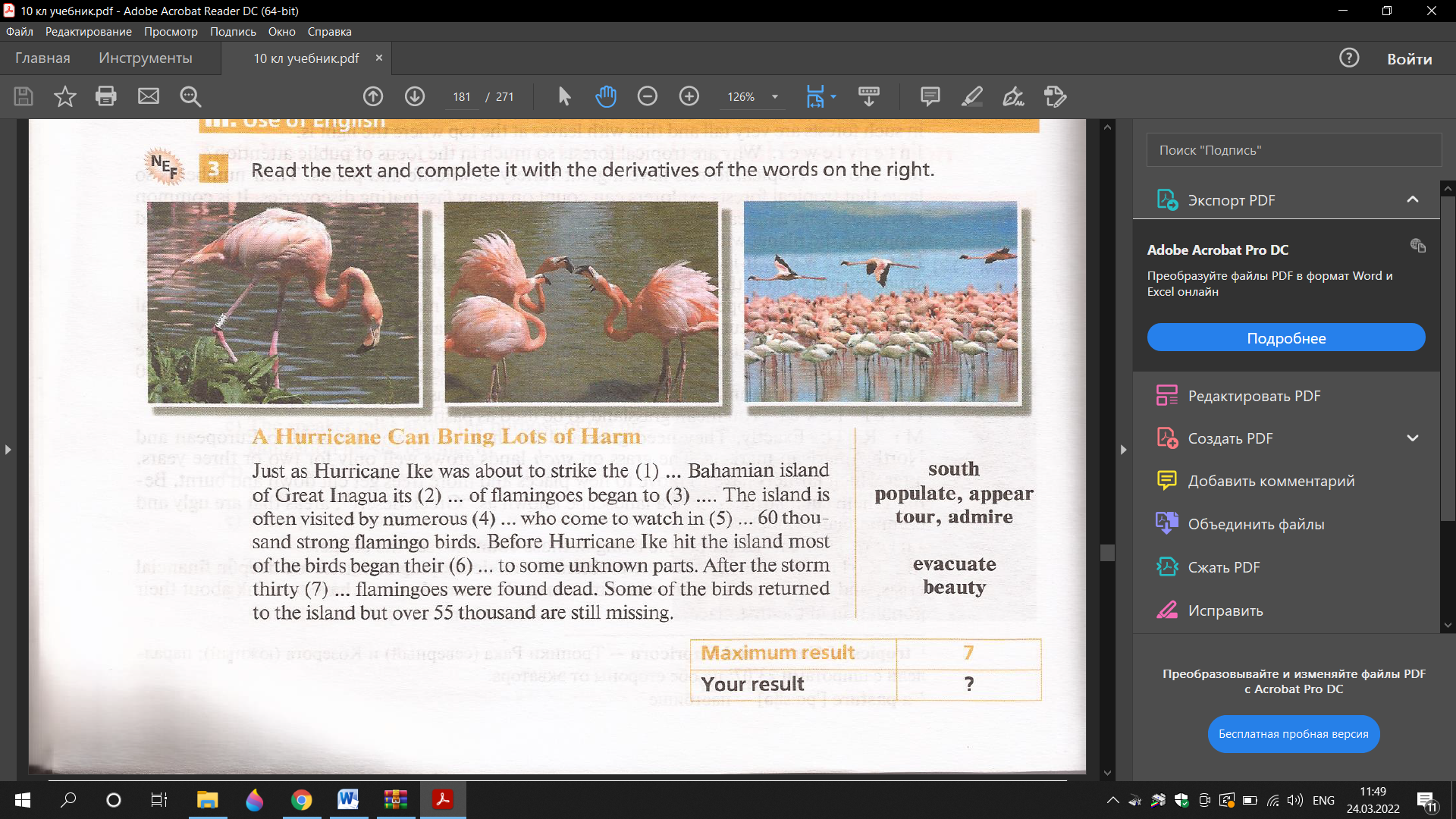
Task 4. Choose the appropriate words to complete the sentences.
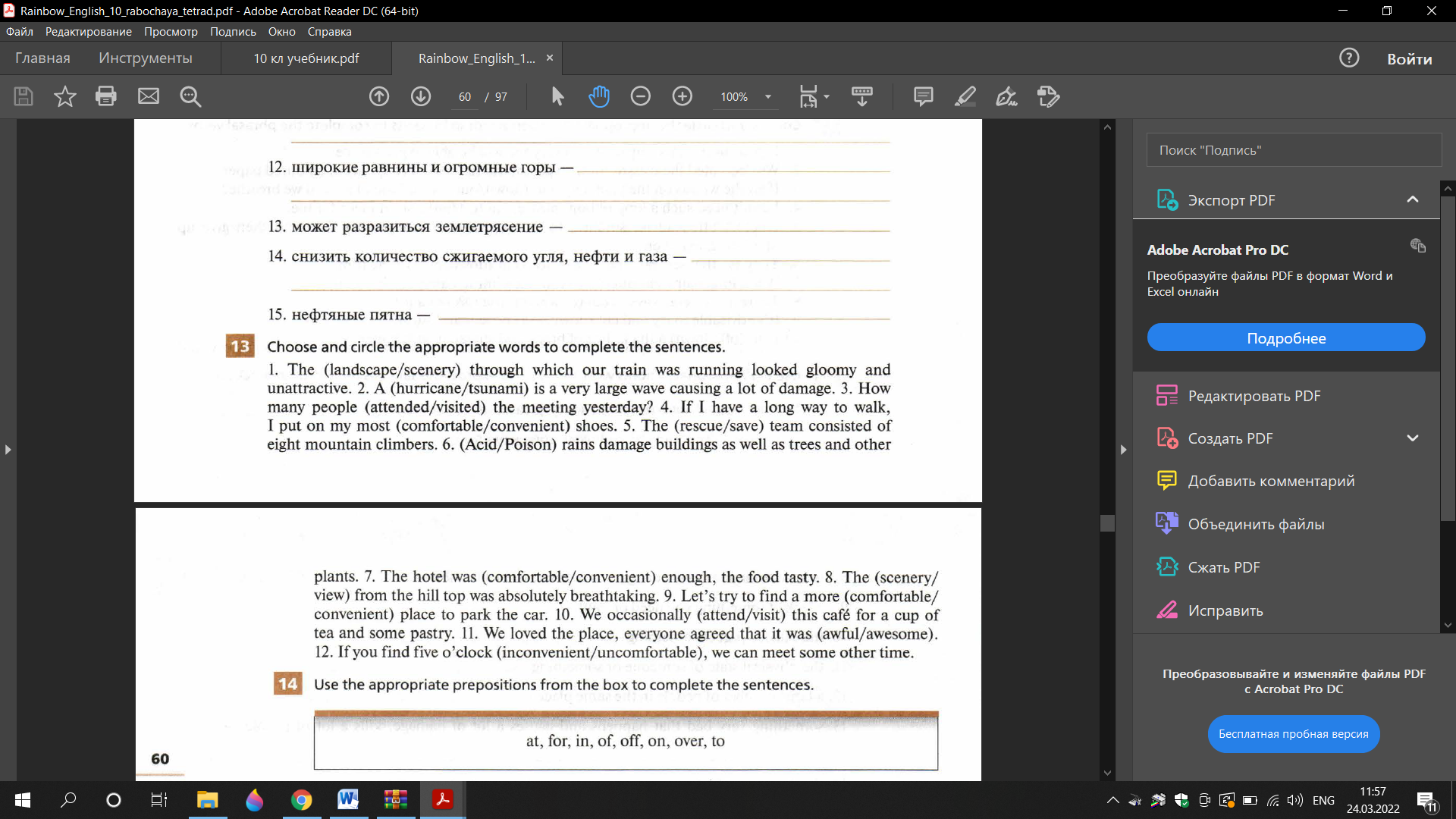

Task 5. Choose the appropriate function words in brackets to complete the phrasal verbs.
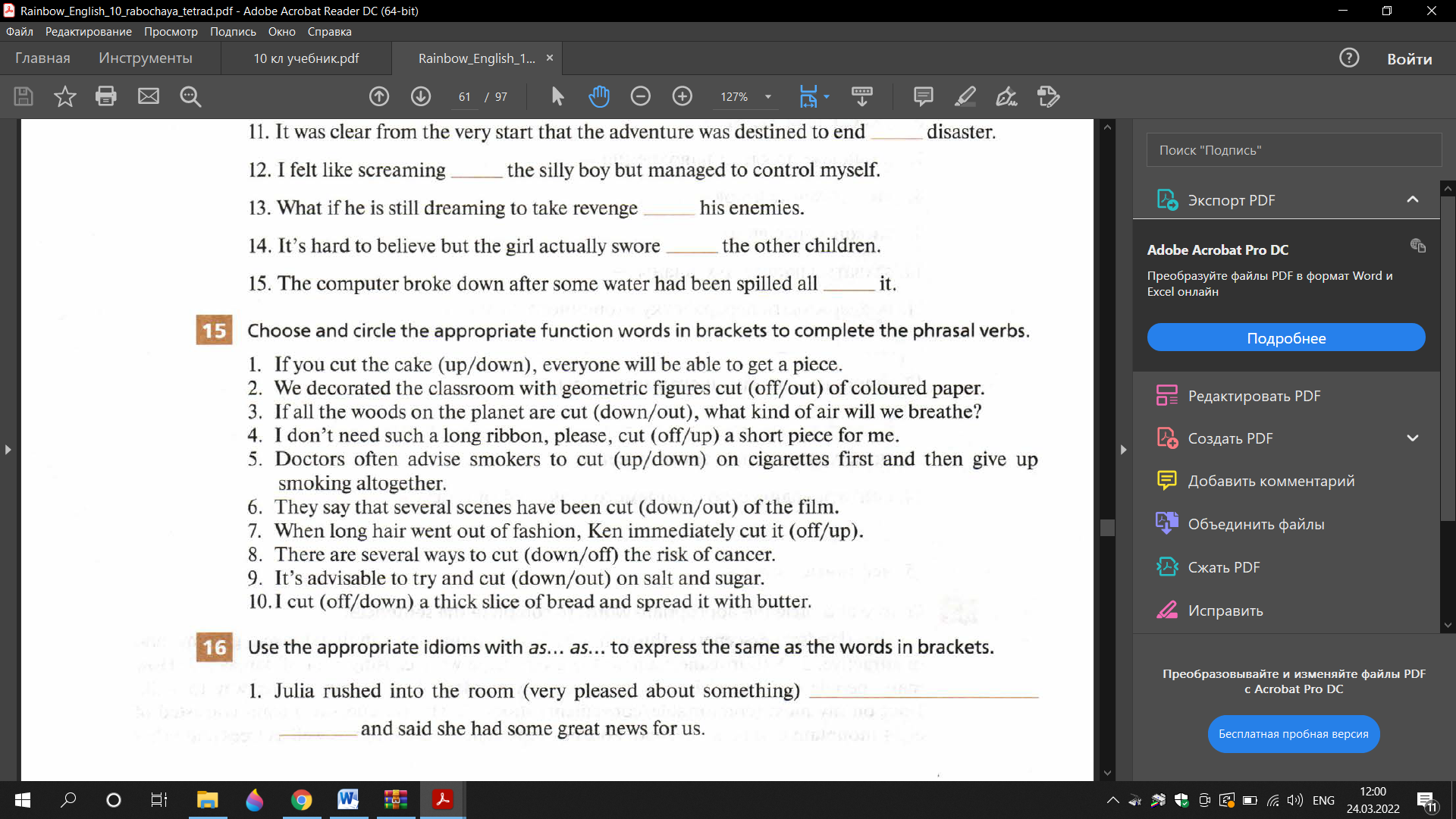
*Task 6. Complete the text using the appropriate forms of the words on the right.
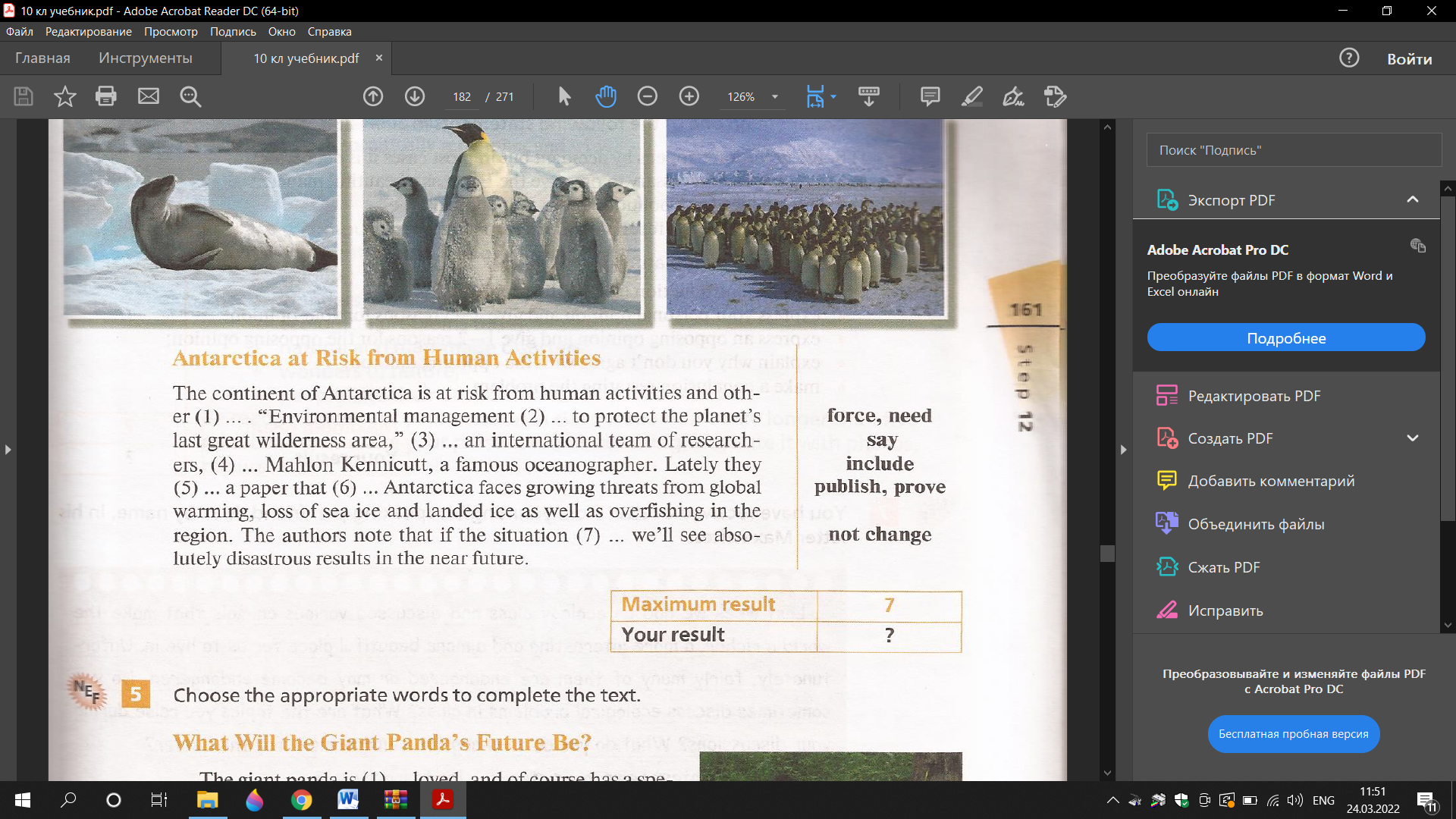
Task 6. Complete the sentences using a/an, the and zero article where necessary.
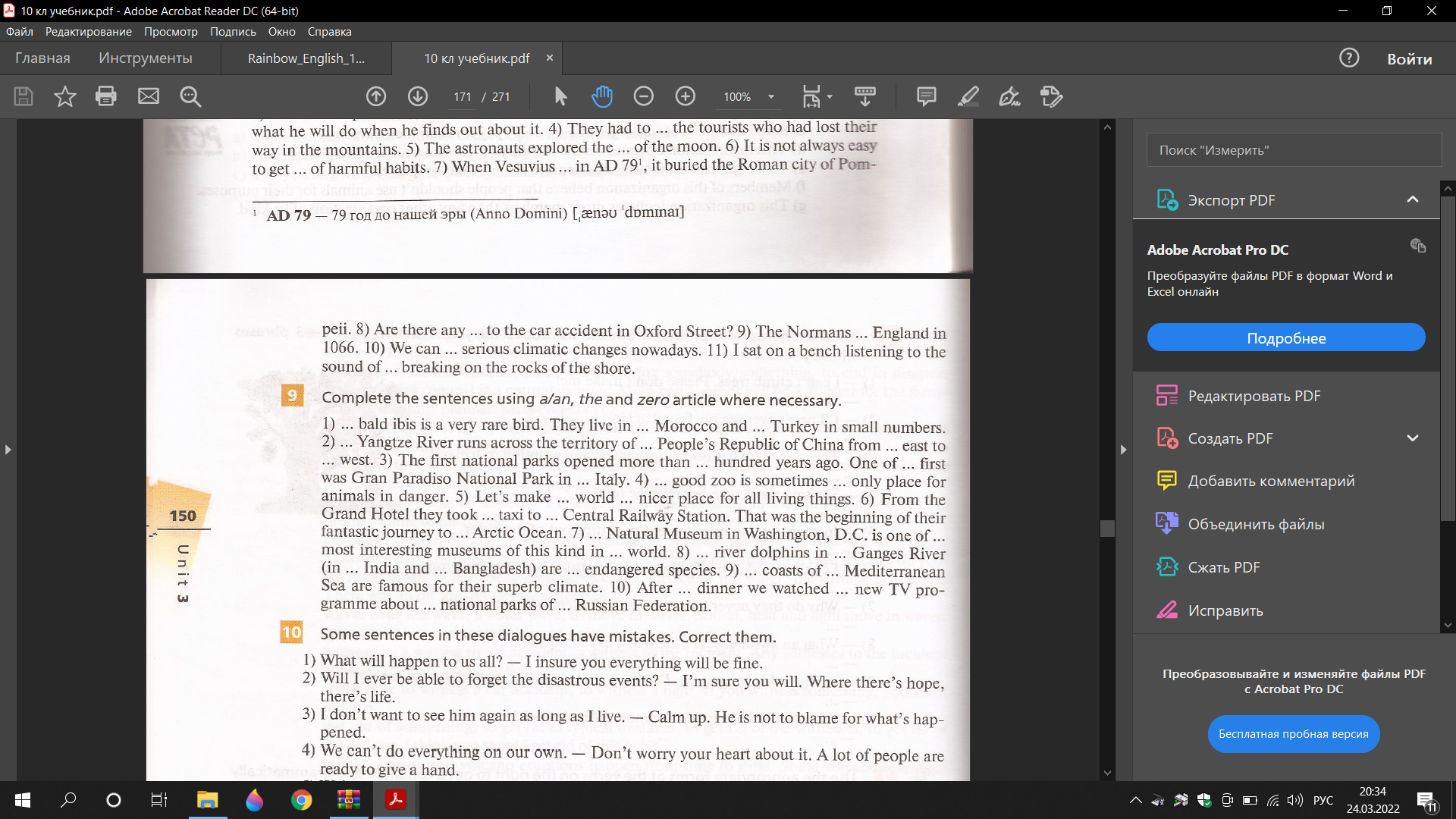
Task 6. Complete the sentences using a/an, the and zero article where necessary.

Task 6. Complete the sentences using a/an, the and zero article where necessary.

Task 6. Complete the sentences using a/an, the and zero article where necessary.

Task 6. Complete the sentences using a/an, the and zero article where necessary.

Task 6. Complete the sentences using a/an, the and zero article where necessary.

Task 6. Complete the sentences using a/an, the and zero article where necessary.

Task 6. Complete the sentences using a/an, the and zero article where necessary.

Task 6. Complete the sentences using a/an, the and zero article where necessary.

Task 6. Complete the sentences using a/an, the and zero article where necessary.

Task 6. Complete the sentences using a/an, the and zero article where necessary.

Task 6. Complete the sentences using a/an, the and zero article where necessary.

Task 6. Complete the sentences using a/an, the and zero article where necessary.

Task 6. Complete the sentences using a/an, the and zero article where necessary.

Task 6. Complete the sentences using a/an, the and zero article where necessary.































